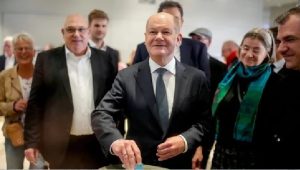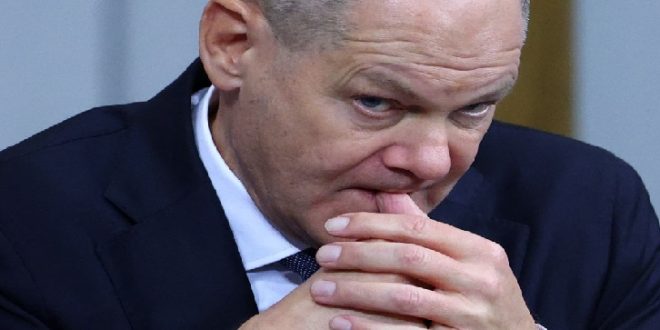18-12-2024
BERLIN: German Chancellor Olaf Scholz has lost a vote of confidence in parliament, paving the way for early elections on 23 February.
Scholz called Monday’s vote and had expected to lose it, but calculated that triggering an early election was his best chance of reviving his party’s political fortunes.
 It comes around two months after the collapse of Scholz’s three-party coalition government, which left the embattled chancellor leading a minority administration.
It comes around two months after the collapse of Scholz’s three-party coalition government, which left the embattled chancellor leading a minority administration.
Ahead of Monday’s vote, Scholz said it would now be up to voters to “determine the political course of our country”, teeing up what is likely to be a fiercely fought election campaign.
Losing Monday’s no-confidence vote was the outcome Scholz had wanted.
Thanks to the loss, elections can now happen in February, rather than in September as originally scheduled.
There were 207 MPs, mainly from his own party, who voted for Scholz, while 394 voted against him and 116 abstained.
Since Scholz’s argumentative three-party governing coalition collapsed in November, he had been reliant on support from the opposition conservatives to pass any new laws, effectively rendering his administration a lame-duck government.
Given Germany’s stalled economy and the global crises facing the West, staggering on until the scheduled election date of September 2025 risked being seen as irresponsible by the electorate.
Scholz’s Social Democratic Party (SDP) is trailing heavily in opinion polls, while the conservative Christian Democratic Union (CDU) under Friedrich Merz appears to be on course for a return to government.
Opening the debate ahead of Monday’s vote, Scholz said the snap election was an opportunity to set a new course for the country and called for “massive” investment, particularly in defence, while Merz said more debt would be a burden for younger generations and promised tax cuts.
 Scholz’s decision to stage a vote he expected to lose in order to dissolve his own government was described as a “kamikaze” move by the German tabloid Bild but it is generally the only way a German government can dissolve parliament and spark early elections.
Scholz’s decision to stage a vote he expected to lose in order to dissolve his own government was described as a “kamikaze” move by the German tabloid Bild but it is generally the only way a German government can dissolve parliament and spark early elections.
The process was designed specifically by the post-war founders of modern Germany to avoid the political instability of the Weimar era.
This vote of confidence is not a political crisis in itself: it is a standard constitutional mechanism that has been used by modern German chancellors five times to overcome political stalemate and one Gerhard Schroder deployed on two occasions.
However, there is a deeper problem within German politics.
On the surface, the collapse of the coalition was sparked by a row over money. Scholz’s centre-left SDP and his Green partners wanted to ease Germany’s strict debt rules to finance support for Ukraine and key infrastructure projects.
That was blocked by Scholz’s own finance minister, Christian Lindner, who is the leader of the business-friendly liberal Free Democratic Party (FDP), which prioritized driving down the debt.
Lindner was sacked and the coalition collapsed. After years of unedifying bickering, you could almost hear the sigh of relief in Berlin’s corridors of power but the underlying cause is more difficult to resolve and more worrying.
Germany’s party political system has become more fragmented, with more parties than ever in parliament. The new upstart political forces are also more radical.
In 2017, the far-right Alternative for Germany (AfD) entered the Bundestag for the first time, winning 12.6%. (Int’l News Desk)
 Pressmediaofindia
Pressmediaofindia




